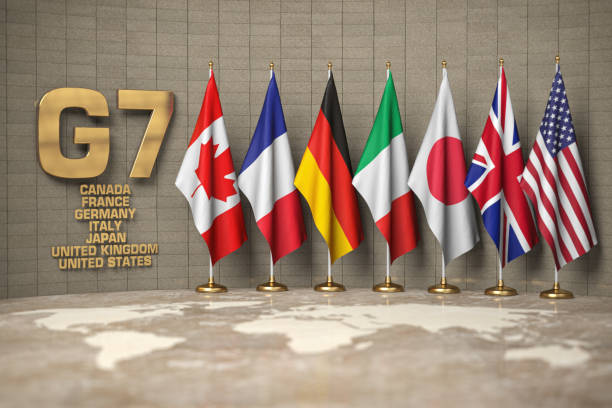Weissenhaus, Germany/New York, May 14 – The world’s seven leading economies (G7) and the European Union said in a statement concluding their three-day meeting in Weissenhaus that the Russia’s war in Ukraine is responsible for spiked food and commodity prices that are threatening millions of people, particularly in poor countries in Africa and the Middle East. The UN Security Council in New York has scheduled an open debate on May 19 on the war’s impacts on the global economy.
The statement said the “war of aggression against Ukraine” and unilateral actions preventing Ukraine’s exports of agricultural products have led to “steep price rises in commodity markets and the threats we are now seeing to global food security.”
“As global markets suffer from Russia’s war of choice by rising food and commodity prices, thus affecting the lives of people around the world and exacerbating existing humanitarian and protection needs, we are determined to contribute additional resources to and support all relevant efforts that aim to ensure availability and accessibility of food, energy and financial resources as well as basic commodities for all.”
The G7, composed of Britain, Canada, France, Germany, Italy, Japan and the United States. called on Russia to immediately cease its attacks on key transport infrastructure in Ukraine, including ports, so that they can be used for exporting Ukrainian agricultural products.
The G7 said it will discuss the causes and consequences of the global food crisis through a Global Alliance for Food Security and will closely cooperate with international partners and organizations beyond the G7 “with the aim of transforming political commitments into concrete actions as planned by various international initiatives such as the Food and Agricultural Resilience Mission (FARM) and key regional outreach initiatives, including towards African and Mediterranean countries.”
The G7 said Russia’s war in Ukraine “violated the UN Charter, undermined the fundamental principles of the European security architecture as enshrined in the Helsinki Final Act and the Charter of Paris and will have to face consequences for its actions.” It also “condemns and will systematically expose Russia’s policy of information manipulation and interference, including disinformation which it employs to justify and support its war of aggression against Ukraine and which deliberately aims at manipulating public opinions domestically and worldwide with a view to covering its responsibilities in the ongoing war.”
UN Security Council to discuss war’s impacts on food security on May 19
US Secretary of State Antony Blinken is scheduled to preside a meeting of the 15-nation council on May 19 at which food security issues and the war in Ukraine will be debated with the participation of UN member nations. US Ambassador Linda Thomas-Greenfield, whose country holds the council’s presidency for the month of May, said the meeting will debate war’s impacts on food security.
The World Food Program (WFP), the UN agency that feeds the world’s hungry, has called for the re-opening of ports in Odesa in the Black Sea in order to allow exports of grains and other commodities to the rest of the world. Ukraine and Russia, known as major food baskets, provide up to 30 per cent of global wheat that are needed in developing countries.
WFP Executive Director David Beasley has said that Ukraine’s grain silos are full but the war has stopped all exports. He said 44 million people around the world are facing starvation because of severe shortages and high food prices.
“We have to open up these ports so that food can move in and out of Ukraine. The world demands it because hundreds of millions of people globally depend on these supplies,” he said. “We’re running out of time and the cost of inaction will be higher than anyone can imagine. I urge all parties involved to allow this food to get out of Ukraine to where it’s desperately needed so we can avert the looming threat of famine”.
WFP’s studies showed that 276 million people worldwide were already facing acute hunger at the start of 2022 and that number is expected to rise by 47 million people if the conflict in Ukraine continues, with the steepest rises in sub-Saharan Africa. WFP said most of Ukraine’s food productions before the war could feed some 400 million people and they were shipped through the Black Sea ports.
The World Bank in Washington said in its Commodity Markets Outlook report published on April 25 that Russia’s February 24 war in Ukraine has dealt a “major shock” to commodity markets and has altered global patterns of trade, production, and consumption in ways that will keep prices at historically high levels through the end of 2024.
The report said the increase in energy prices in the past two years has been the largest since the 1973 oil crisis. Price increases for food commodities—of which Russia and Ukraine are large producers—and fertilizers, which rely on natural gas as a production input, have been the largest since 2008.
“Overall, this amounts to the largest commodity shock we’ve experienced since the 1970s. As was the case then, the shock is being aggravated by a surge in restrictions in trade of food, fuel and fertilizers,” said Indermit Gill, the World Bank’s Vice President for Equitable Growth, Finance, and Institutions. “These developments have started to raise the specter of stagflation. Policymakers should take every opportunity to increase economic growth at home and avoid actions that will bring harm to the global economy.”
United Nations correspondent journalists – United Nations correspondent journalists – United Nations correspondent journalists
United Nations journalism articles – United Nations journalism articles – United Nations journalism articles

